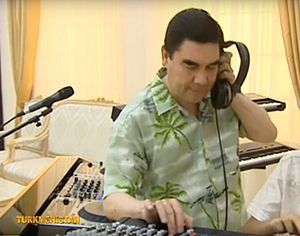What’s happening in Turkmenistan? A relatively simple question, it is decidedly difficult to answer. A pair of stories posted recently by the Chronicles of Turkmenistan help explain the absurd reality of present-day Turkmenistan.
The Chronicles of Turkmenistan is an information portal supported by the Turkmen Initiative for Human Rights (TIHR), a Vienna-based exile group, which tries to fill in the vacant information space regarding the country.
On August 1, the Chronicles posted a story about Turkmenistan’s President Gurbanguly Berdimuhamedov. The story, citing state-run media, detailed the president’s musical pursuits:
According to reports from the state-run information agency Turkmenistan, on Friday 29 July, President Berdymukhammedov together with his two grandsons wrote the lyrics to the new song “Kalbymda sen.” According to the media outlet, the President came up with the idea of this musical piece when he was young.
Moreover, the President is also working to complete a piece of music which still has no lyrics.
The real gem is the video, showing Berdimuhamedov (in what can be best described as a Hawaiian shirt) and his two grandsons tinkering with various muscle instruments, DJing and dancing. While I have not been able to track down the original story, a visit to the Turkmen State News Agency revealed a similar fluff piece posted as news: “President Gurbanguly Berdymuhamedov took a bicycle ride.”
On August 2, the Chronicles posted a story on Turkmen workers stocking up on foodstuffs. The meat of the article is that employees in various sectors–particularly public sector employees–have not been paid in months or have been subjected to forced unpaid leave:
Teaching staff of Turkmenabad schools (formerly Chardjou) have not received annual leave pay and salaries for June and July. The staff members of the municipal military enlistment office have not been paid since May. A similar situation is being observed in the majority of organizations and agencies in Lebap velayat.
Gas workers in this province have not received salaries or have been forced to take unpaid leave.
Meanwhile, food prices have risen in the face of economic uncertainty and the end of free currency conversions: “Despite a considerable price hike those who can afford it are stocking up with non-perishable foods such as sugar, vegetable oil, flour etc.”
These two stories, held next to each other, are nothing short of sledgehammer-style satire, Ashgabat’s absurdities laid bare. The president plays in a pristine white room with a baby grand piano and an array of keyboards and DJ-gear–while the country’s citizens scramble at the grocery store to stock up on flour. Leaders around the world are ridiculed by their opponents for their frivolities, but reporting on U.S. President Barack Obama’s golfing doesn’t come with a possible prison sentence.
It’s problematic to just cite an exile-run media operation, but there are few other options. Such stories deserve solid investigation–dividing facts from rumors with regard to public employees not being paid, changes in previous free public services, near constant shuffling of ministers, and more–but independent journalists in Turkmenistan are under very real threat. State-run media is little more than a mouthpiece to fluff the president’s persona and poking round in Turkmenistan is a dangerous game.
To the world, Ashgabat likes to present a face of pristine marble, world-record eccentricities, and stability. But the cracks are showing: the country’s border with Afghanistan worries many analysts; reports of unpaid workers and end of previous free services gives the lie to state claims of economic stability; the overall opacity in the country’s massive energy projects ensures that the outside world has little notion as to their actual feasibility, progress, or potential for profit–not to mention ministry shuffles and changes likened to “moving deck chairs around as the Titanic sinks“; and all the while, the emperor fiddles.

































